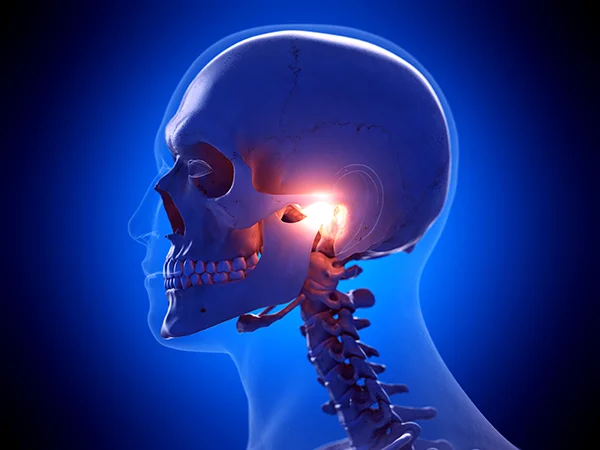Could a Single Nerve Cause TMJ Misery?
Posted on 8/1/2024 by Kian Djawdan DMD |
 Imagine this: you're enjoying dinner with friends, laughing and sharing stories. Suddenly, you feel a sharp pain in your jaw, making it difficult to chew. This pain persists even after the meal, accompanied by clicking or popping sounds when you open your mouth. You might be experiencing temporomandibular joint disorder, or TMJ. Imagine this: you're enjoying dinner with friends, laughing and sharing stories. Suddenly, you feel a sharp pain in your jaw, making it difficult to chew. This pain persists even after the meal, accompanied by clicking or popping sounds when you open your mouth. You might be experiencing temporomandibular joint disorder, or TMJ.
TMJ affects millions of people worldwide, causing discomfort and impacting daily life. While the causes of TMJ are varied, a single nerve – the trigeminal nerve – can play a significant role in this condition.
Understanding TMJ and the Trigeminal Nerve
The temporomandibular joint, or TMJ, connects your jawbone to your skull. This hinge-like joint allows for movement like chewing, talking, and yawning. The trigeminal nerve, the largest cranial nerve, provides sensation to your face, including the jaw, teeth, and gums. It also plays a crucial role in chewing muscles.
When the TMJ is functioning properly, the muscles and nerves work in harmony. However, factors like jaw misalignment, teeth grinding, arthritis, or even stress can disrupt this delicate balance, leading to TMJ disorder.
How the Trigeminal Nerve contributes to TMJ Pain
The trigeminal nerve can contribute to TMJ pain in several ways:
| • |
Inflammation: When the TMJ is inflamed, it can irritate the trigeminal nerve, leading to pain, tenderness, and even burning sensations.
|
| • |
Muscle Spasms: Muscle spasms in the jaw can compress the trigeminal nerve, causing pain that radiates to the face, neck, and even the head.
|
| • |
Nerve Compression: In some cases, the trigeminal nerve can become compressed due to structural changes in the jaw or surrounding tissues, leading to chronic pain and other neurological symptoms. |
Recognizing TMJ Symptoms
Beyond jaw pain, other common TMJ symptoms include:
| • |
Clicking or popping sounds in the jaw
|
| • |
Difficulty opening or closing the mouth fully
|
| • |
Locking of the jaw
|
| • |
Facial pain
|
| • |
Headaches
|
| • |
Earaches
|
| • |
Ringing in the ears (tinnitus) |
Taking Control of Your TMJ Pain
If you suspect you have TMJ, it's crucial to seek professional help from your dentist or an oral surgeon. They will conduct a thorough examination, including imaging tests, to diagnose the underlying cause of your pain and recommend appropriate treatment.
Treatment options for TMJ vary depending on the severity and cause of the disorder. They may include:
| • |
Oral Appliances: Custom-made mouthguards can help reposition the jaw and relax the muscles, reducing pain and improving joint function.
|
| • |
Medications: Anti-inflammatory drugs, muscle relaxants, and even antidepressants can help manage pain and discomfort.
|
| • |
Physical Therapy: Specific exercises can strengthen and stretch the jaw muscles, improving joint mobility and reducing pain.
|
| • |
Injections: In some cases, corticosteroid injections may be used to reduce inflammation around the nerve.
|
| • |
Surgery: While rare, surgery may be necessary to correct structural problems in the jaw joint or relieve nerve compression. |
Restoring Your Oral Harmony
Addressing TMJ involves a holistic approach that focuses not only on pain management but also on restoring the proper function of the jaw joint and the surrounding muscles. This may involve collaborating with other healthcare professionals like physical therapists or pain management specialists.
By working closely with your dental team and understanding the role of the trigeminal nerve in TMJ, you can regain control of your oral health and alleviate the discomfort associated with this condition. Remember, early diagnosis and intervention are key to managing TMJ and restoring your oral harmony. |
|
